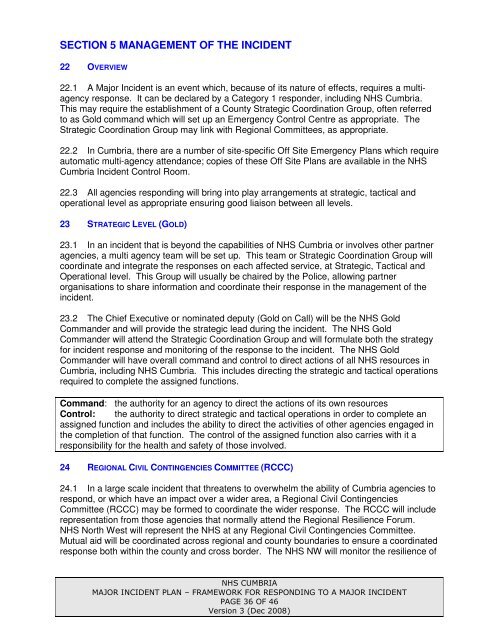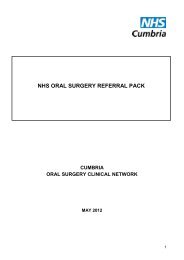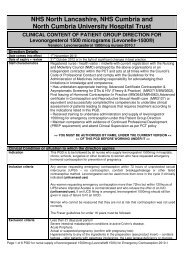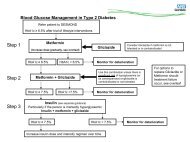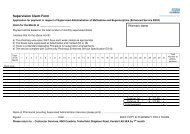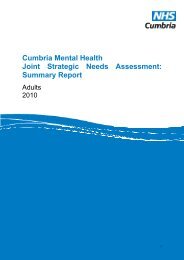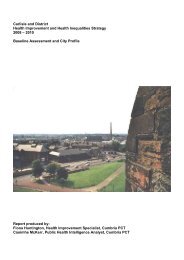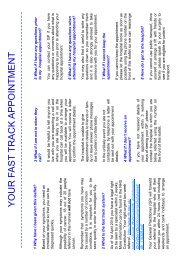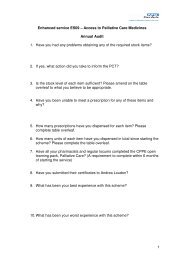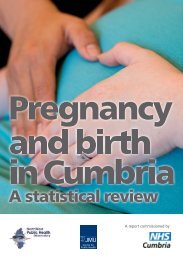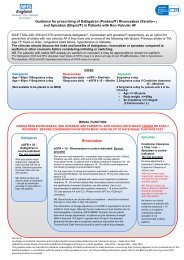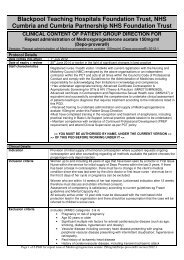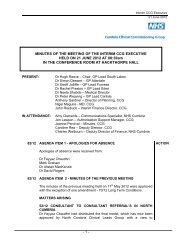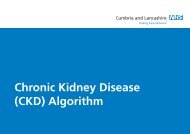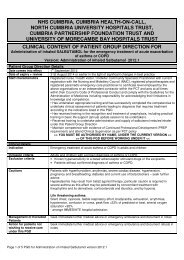MAJOR INCIDENT PLAN - NHS Cumbria
MAJOR INCIDENT PLAN - NHS Cumbria
MAJOR INCIDENT PLAN - NHS Cumbria
Create successful ePaper yourself
Turn your PDF publications into a flip-book with our unique Google optimized e-Paper software.
SECTION 5 MANAGEMENT OF THE <strong>INCIDENT</strong>22 OVERVIEW22.1 A Major Incident is an event which, because of its nature of effects, requires a multiagencyresponse. It can be declared by a Category 1 responder, including <strong>NHS</strong> <strong>Cumbria</strong>.This may require the establishment of a County Strategic Coordination Group, often referredto as Gold command which will set up an Emergency Control Centre as appropriate. TheStrategic Coordination Group may link with Regional Committees, as appropriate.22.2 In <strong>Cumbria</strong>, there are a number of site-specific Off Site Emergency Plans which requireautomatic multi-agency attendance; copies of these Off Site Plans are available in the <strong>NHS</strong><strong>Cumbria</strong> Incident Control Room.22.3 All agencies responding will bring into play arrangements at strategic, tactical andoperational level as appropriate ensuring good liaison between all levels.23 STRATEGIC LEVEL (GOLD)23.1 In an incident that is beyond the capabilities of <strong>NHS</strong> <strong>Cumbria</strong> or involves other partneragencies, a multi agency team will be set up. This team or Strategic Coordination Group willcoordinate and integrate the responses on each affected service, at Strategic, Tactical andOperational level. This Group will usually be chaired by the Police, allowing partnerorganisations to share information and coordinate their response in the management of theincident.23.2 The Chief Executive or nominated deputy (Gold on Call) will be the <strong>NHS</strong> GoldCommander and will provide the strategic lead during the incident. The <strong>NHS</strong> GoldCommander will attend the Strategic Coordination Group and will formulate both the strategyfor incident response and monitoring of the response to the incident. The <strong>NHS</strong> GoldCommander will have overall command and control to direct actions of all <strong>NHS</strong> resources in<strong>Cumbria</strong>, including <strong>NHS</strong> <strong>Cumbria</strong>. This includes directing the strategic and tactical operationsrequired to complete the assigned functions.Command: the authority for an agency to direct the actions of its own resourcesControl: the authority to direct strategic and tactical operations in order to complete anassigned function and includes the ability to direct the activities of other agencies engaged inthe completion of that function. The control of the assigned function also carries with it aresponsibility for the health and safety of those involved.24 REGIONAL CIVIL CONTINGENCIES COMMITTEE (RCCC)24.1 In a large scale incident that threatens to overwhelm the ability of <strong>Cumbria</strong> agencies torespond, or which have an impact over a wider area, a Regional Civil ContingenciesCommittee (RCCC) may be formed to coordinate the wider response. The RCCC will includerepresentation from those agencies that normally attend the Regional Resilience Forum.<strong>NHS</strong> North West will represent the <strong>NHS</strong> at any Regional Civil Contingencies Committee.Mutual aid will be coordinated across regional and county boundaries to ensure a coordinatedresponse both within the county and cross border. The <strong>NHS</strong> NW will monitor the resilience of<strong>NHS</strong> CUMBRIA<strong>MAJOR</strong> <strong>INCIDENT</strong> <strong>PLAN</strong> – FRAMEWORK FOR RESPONDING TO A <strong>MAJOR</strong> <strong>INCIDENT</strong>PAGE 36 OF 46Version 3 (Dec 2008)


